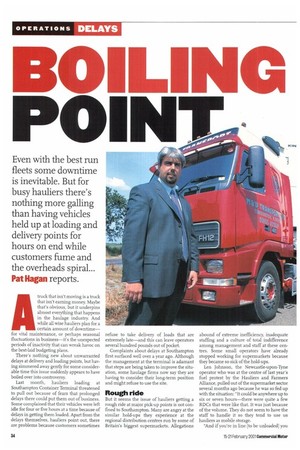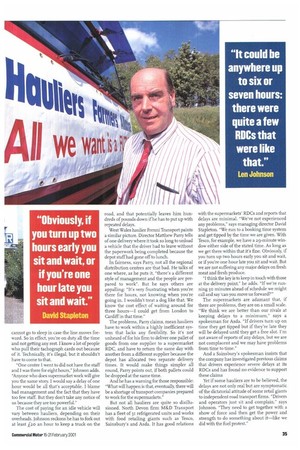PO NT
Page 36

Page 37

If you've noticed an error in this article please click here to report it so we can fix it.
Atruck that isn't moving is a truck that isn't earning money. Maybe that's obvious, but it underpins almost everything that happens in the haulage industry. And while all wise hauliers plan for a certain amount of downtime— for vital maintenance, or perhaps seasonal fluctuations in business—it's the unexpected periods of inactivity that can wreak havoc on the best-laid budgeting plans.
There's nothing new about unwarranted delays at delivery and loading points, but having simmered away gently for some considerable time this issue suddenly appears to have boiled over into controversy.
Last month, hauliers loading at Southampton Container Terminal threatened to pull out because of fears that prolonged delays there could put them out of business. Some complained that their vehicles were left idle for four or five hours at a time because of delays in getting them loaded, Apart from the delays themselves, hauliers point out, there are problems because customers sometimes refuse to take delivery of loads that are extremely late—and this can leave operators several hundred pounds out of pocket.
Complaints about delays at Southampton first surfaced well over a year ago. Although the management at the terminal is adamant that steps are being taken to improve the situation, some haulage firms now say they are having to consider their long-term position and might refuse to use the site.
Rough ride
But it seems the issue of hauliers getting a rough ride at major pick-up points is not confined to Southampton. Many are angry at the similar hold-ups they experience at the regional distribution centres run by some of Britain's biggest supermarkets. Allegations
abound of extreme inefficiency, inadequate staffing and a culture of total indifference among management and staff at these centres. Some small operators have already stopped working for supermarkets because they became so sick of the hold-ups.
Len Johnson, the Newcastle-upon-Tyne operator who was at the centre of last year's fuel protest by the Hauliers and Farmers Alliance, pulled out of the supermarket sector several months ago because he was so fed up with the situation: "It could be anywhere up to six or seven hours—there were quite a few RDCs that were like that. It was just because of the volume. They do not seem to have the staff to handle it so they tend to use us hauliers as mobile storage.
"And if you're in line [to be unloaded] you cannot go to sleep in case the line moves forward. So in effect, you're on duty all the time and not getting any rest. I know a lot of people who pull their tachograph cards out because of it. Technically, it's illegal, but it shouldn't have to come to that.
"One centre I went to did not have the staff and I was there for eight hours," Johnson adds. "Anyone who does supermarket work will give you the same story. I would say a delay of one hour would be all that's acceptable. I blame bad management and the fact that they have too few staff. But they don't take any notice of us because they are too powerful."
The cost of paying for an idle vehicle will vary between hauliers, depending on their overheads. Johnson reckons he has to fork out at least f2o an hour to keep a truck on the road, and that potentially leaves him hundreds of pounds down if he has to put up with repeated delays.
West Wales haulier Frenni Transport paints a similar picture. Director Matthew Parry tells of one delivery where it took so long to unload a vehicle that the driver had to leave without the paperwork being completed because the depot staff had gone off to lunch.
In fairness, says Parry, not all the regional distribution centres are that bad. He talks of one where, as he puts it, "there's a different style of management and the people are prepared to work". But he says others are appalling: "It's very frustrating when you're there for hours, not knowing when you're going in. I wouldn't treat a dog like that. We know the cost effect of waiting around for three hours—I could get from London to Cardiff in that time."
The problems, Parry claims, mean hauliers have to work within a highly inefficient system that lacks any flexibility. So it's not unheard of for his firm to deliver one pallet of goods from one supplier to a supermarket RDC, and have to return the same day with another from a different supplier because the depot has allocated two separate delivery times. It would make things simpler all round, Parry points out, if both pallets could be dropped at the same time.
And he has a warning for those responsible: "What will happen is that, eventually, there will be a shortage of transport companies prepared to work for the supermarkets."
But not all hauliers are quite so disillusioned. North Devon firm M&D Transport has a fleet of 31 refrigerated units and works with food retailing giants such as Tesco, Sainsbury's and Asda. It has good relations with the supermarkets' RDCs and reports that delays are minimal. "We've not experienced any problems," says managing director David Stapleton, "We run to a booking time system and get tipped by the time we are given. With Tesco, for example, we have a 29-minute window either side of the stated time. As long as we get there within that it's fine. Obviously, if you turn up two hours early you sit and wait, or if you're one hour late you sit and wait. But we are not suffering any major delays on fresh meat and fresh produce.
"I think the key is to keep in touch with those at the delivery point," he adds. "If we're running 50 minutes ahead of schedule we might call and say 'can you move us forward?'"
The supermarkets are adamant that, if there are problems, they are on a small scale. "We think we are better than our rivals at keeping delays to a minimum," says a spokesman for Asda, "If drivers turn up on time they get tipped but if they're late they will be delayed until they get a free slot. I'm not aware of reports of any delays, but we are not complacent and we may have problems from time to time."
And a Sainsbury's spokesman insists that the company has investigated previous claims that drivers experience severe delays at its RDCs and has found no evidence to support these claims Yet if some hauliers are to be believed, the delays are not only real but are symptomatic of the dictatorial attitude of some retail giants to independent road transport firms. "Drivers and operators just sit and complain," says Johnson. "They need to get together with a show of force and then get the power and strength to do something about it—like we did with the fuel protest."




































































































